
I’m sure you must have wondered what a blog is and why people talk about blogs a lot. You must’ve come across many blogs yourself while searching for something on the Internet.
And you also must’ve stumbled across the term blogging.
So, the big is question is: What is a blog? And how does it work?
Well, in this guide, I’ll be answering all these questions. You’ll learn the meaning of a blog, how a blog works, its purpose, and how does it differ from a website.
Moreover, we’ll also take a look at different types of blogs and some examples to give you a much better understanding of blogs.
Let’s get started.
Blog Definition & Meaning
A blog is a website where content is updated on a regular basis about single or multiple topics. In simple terms, it’s a journal where new information is added regularly.
Each piece of content on a blog is referred to as a blog post or an article. An article can be of any topic. It can be informational content such as healthy juice recipes or a news article about the new car launched by Tesla.
Blogs have been around since 1994 when Justin Hall, a student of the Swarthmore College created the first blog. Since then many people created their own blogs.
The term blog was coined by the words web + log = weblogs which later became just blogs.
In the early stages, blogs were simply personal pages or journals where people talked about themselves, their lives, and shared their opinions about different topics.
How A Blog Works
Before we get into more details about a blog, it’s essential to understand how a blog works.
You now already know the definition of a blog and what a blog post is. But how does this all work?
A blog runs on platforms that let you publish blog posts regularly. Yes, you can build your own blog by coding it yourself but that’s not efficient since there are many platforms that let you create a blog and publish articles with a few clicks.
One of the first blogging platforms is Blogger. This platform skyrocketed the popularity of blogs as now anyone can start their own blog for free.
Blogger was launched in 1999 but was later acquired by Google in 2003. In 2003, another blogging platform was launched which changed the landscape of the Internet forever.
This platform was WordPress which is another platform like Blogger that lets people start and run a blog.
The best part about these platforms was that they were free (and still are) which made them accessible for everyone who wanted their own blog on the Internet.
With blogging platforms like Blogger and WordPress, you can create a blog. These platforms have features that let you write your blog post and publish it to your blog.
The latest published blog post then shows up at the top of your blog.
That’s basically how a blog works and you must be thinking that it’s so simple.
The Difference Between A Blog and A Website
So, what’s the difference between a blog and a website? Isn’t a blog also a website? Is a website a blog?
Well, I’m sure you have these questions running in your mind right now.
A blog is typically a section of a website that posts content periodically whereas a website provides static information about a business, person, group, or organization.
The important word to remember here is static.
A blog is dynamic as new blog posts get updated on it frequently. But a website is static because new information isn’t added frequently. Yes, updates are made to a website but not as frequent as a blog.
Many big websites have their own blogs as a way to engage and update their audience about their business.
For example, here’s what our website looks like:

As you can see from the image above, the website presents static information about our WordPress plugin.
But you can see that we have a Blog on our menu. And when you go to the blog page, you’ll see all our blog posts in reverse chronological order:
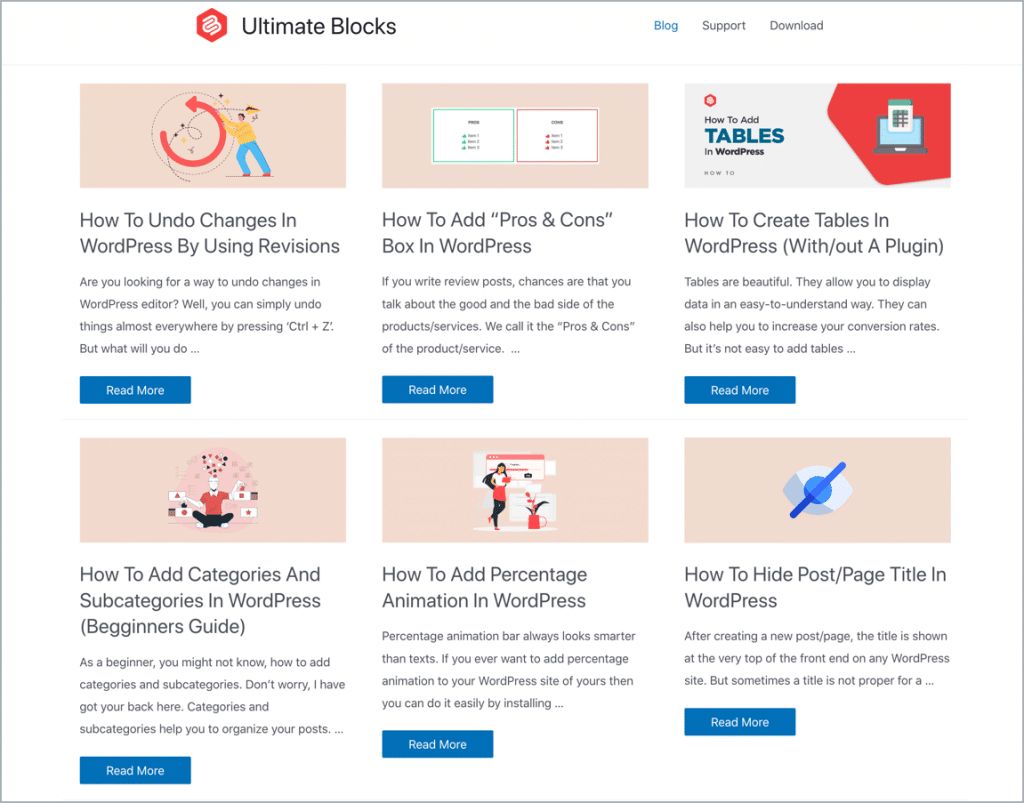
In a nutshell, a blog is also a website.
But can a website be a blog?
Well, yes. There are websites that are just blogs and only publish blog posts. Here’s an example of one of our websites that is simply a blog:
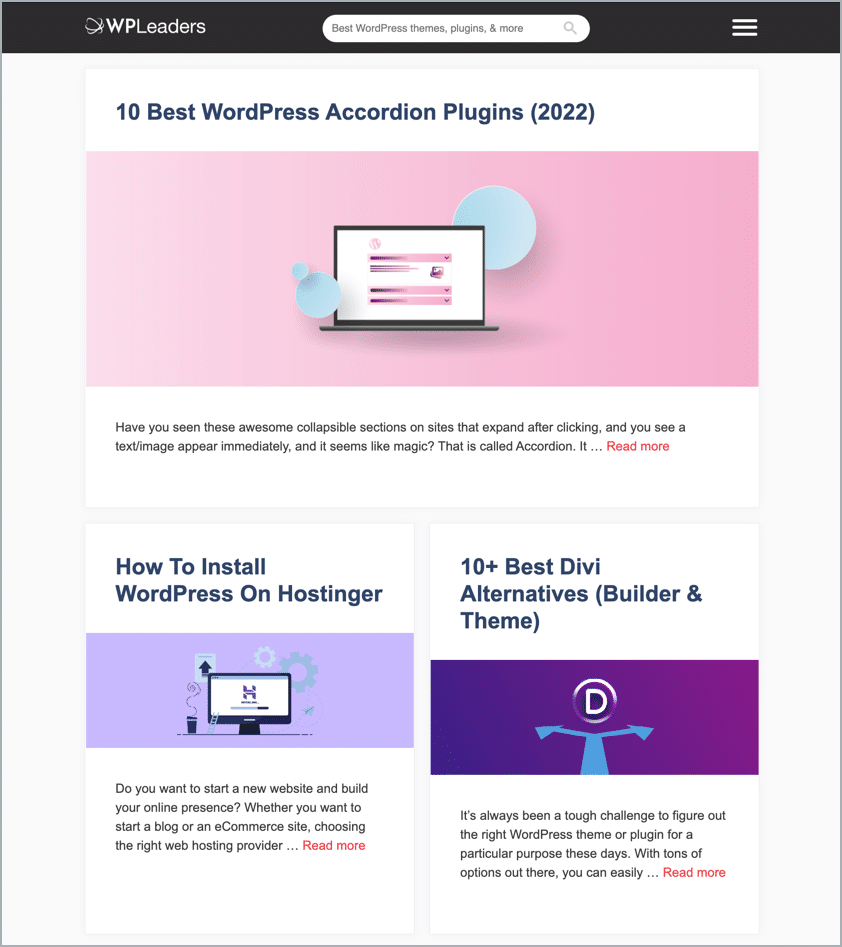
As you open the WPLeaders website, you’ll see blog post entries on the homepage. That’s because this website is a blog only with a few static pages.
The Purpose Of A Blog
So, what’s the purpose of all this? Why create blogs? Why spend so much time writing blog posts regularly and updating them on a blog?
There are many purposes and motivations behind starting a blog and it depends on the person.
For an individual, a blog can be a good way to build an audience and connect with people. For some people, a blog is a way to make money online.
For organizations and businesses, a blog can help them share and educate news about their business and products.
Today, blogging has become a marketing strategy for many businesses and individuals.
Regardless of who you are, blogging has some benefits that are universal to everyone. Here are some reasons why people build a blog:
- To build an audience and community online.
- Showcase your knowledge, talent, and skills.
- Become an expert or influencer in an industry.
- Connect with like-minded people.
- Make money online through different monetization methods.
- Educate and inform customers about your business and products.
- Increase brand awareness and boost online reputation.
These are just some benefits of blogging and the motivation behind why people start a blog.
Types of Blogs
There are many blogs out there and they can be categorized into different types. Here are some common types of blogs on the Internet.
1. Personal Blog
A personal blog is more of an online journal where the author shares their thoughts, opinions, and news about their hobbies and interests.
In the early stages of blogging, personal blogs were present all over the Internet. Over time, the popularity of personal blogs declined but there are still many personal blogs out there.
A good example of a personal blog is the Dad or Alive blog by Adrian. This blog shares stories and articles about their lives.

While many personal blogs cover a wide range of topics, blogs like this one cover a singular topic.
The best part about running a personal blog is that you can write about anything you like.
2. Industry-Specific Blogs
Industry-specific or also known as niche blogs cover a single topic in the industry. These topics can be very niche or can be a bit broad.
These blogs are typically very popular because they only cover a core topic which helps them build an audience easily. Plus, if you’re an expert in that particular topic, you can write good informational content for your blog.
Some examples of industry-specific blogs include:
- Health Blog
- Travel Blog
- Lifestyle Blog
- Food Blog
- Fashion Blog
- Finance Blog
All the examples above have a core topic behind them which makes them industry-specific blogs.
A good real example of a niche blog is the Android Authority blog which covers all about Android.

While this is an industry-specific blog, some blogs are extremely niche in their topics.
7YearOlds is a terrific example of a highly specific blog that publishes articles only about 7-year-old children.

3. Company Blog
A company or business blog covers topics about their business only. This could include articles about their business or products. It can also include blog posts sharing news or updates about their business.
But nowadays, many companies and business blogs also cover topics that are not directly related to their business.
This is because covering such topics allows them to rank on the search engines for different keywords. This then allows them to drive traffic to their blogs and eventually grow their business.
A good example of a company blog is Drift’s blog which covers wide-ranging topics around their business but also shares news and updates about their product.

4. UGC Blog
A UGC (User-Generated Content) blog doesn’t publish its own content. They usually aggregate content from other blogs or allow guest authors to publish content on their blogs.
These blogs are popular because it allows many freelance writers to publish their content and get exposure. In fact, some UGC blogs even pay writers for publishing blog posts on their websites.
Business2Community is a popular UGC blog that aggregates and publishes content from different authors on their blog.
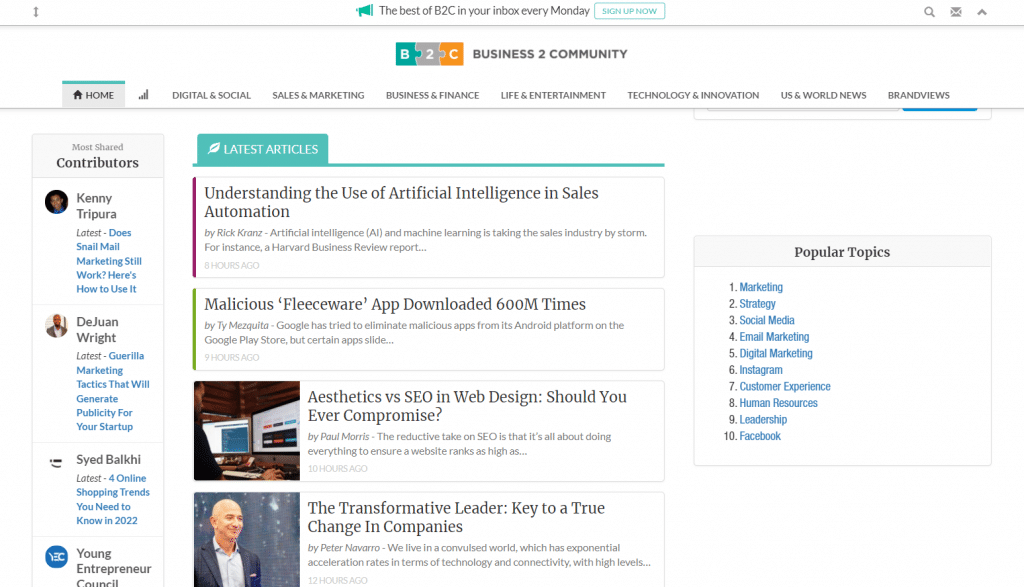
Blog Examples
Now that you’ve seen the different types of blogs, let’s take a look at some examples of blogs. I’ll be showcasing some popular blogs on this list.
1. Seth Godin’s Blog
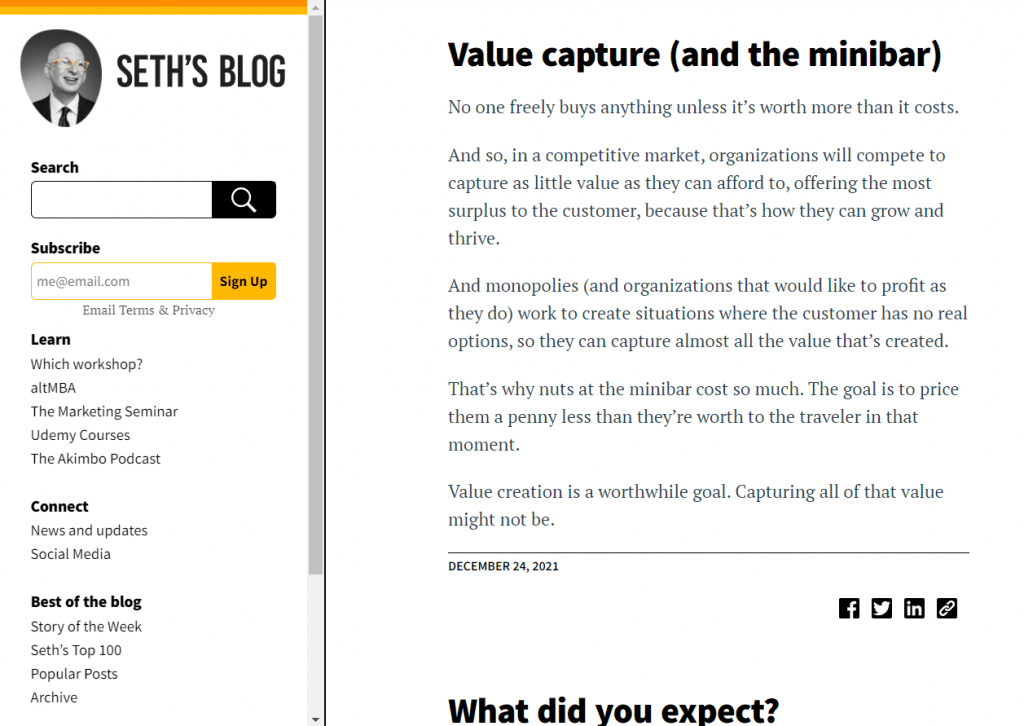
This is a personal blog of marketing mogul Seth Godin who has written 20 best-selling books. I wanted to share this example because Seth Godin writes about marketing on his personal blog.
But what’s amazing about this blog is that he publishes a blog post every single day. And he has been doing this since 2007.
Seth Godin’s blog is a perfect example of personal blogging and how to provide value to your audience.
2. Side Hustle Nation

Side Hustle Nation is a blog by Nick Loper and he writes about different side hustles to make an extra income.
This is a good example of a niche blog with a core audience of people who want to make money online through different side hustles. The blog is filled with case studies, guides, and other useful content on side hustles.
3. Pinch of Yum

Pinch of Yum is a popular food blog that shares recipes. It’s one of the most popular food blogs on the Internet and has been around for a long time.
The author of the blog Lindsay became a full-time blogger after quitting her job as a school teacher.
4. Nerd Fitness
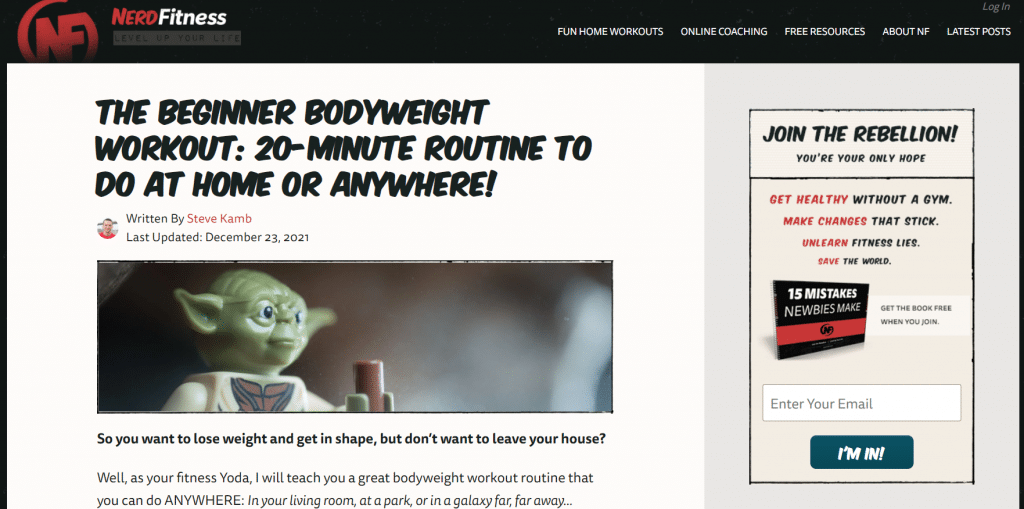
Nerd Fitness is a health and fitness blog for “nerds” and “mutants” who want to get in shape. The blog shares different workouts, meal plans, and more.
The blog is led by Jim Bathurst who is an award-winning trainer. Nerd Fitness is another great example of a niche blog that publishes content for a specific audience.
5. Spotify Blog

Spotify’s blog is a perfect example of a company blog that shares news and updates about its platform and company.
They share content that engages their audience and encourages them to use Spotify more.
Conclusion
By now, you must have understood the meaning of a blog and why do so many people run blogs. In this article, we covered different aspects of blogging to give a good introduction to what blogging means.
Whether you’re an individual who wants to build an audience or a company trying to grow their online presence, a blog is one of the best ways to do it.
If you have any questions regarding blogs, feel free to drop them below in the comments section.
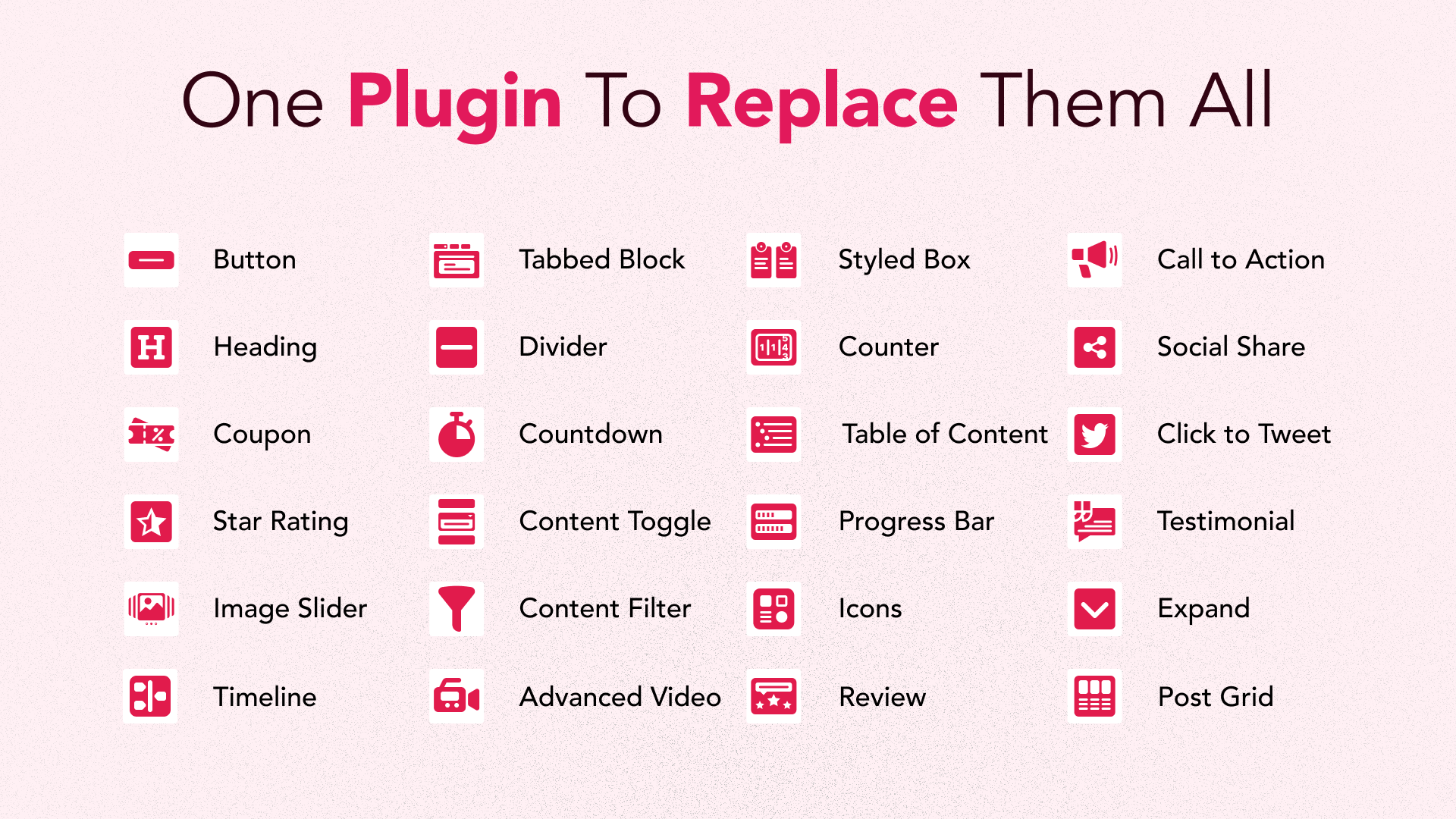
Leave a Reply